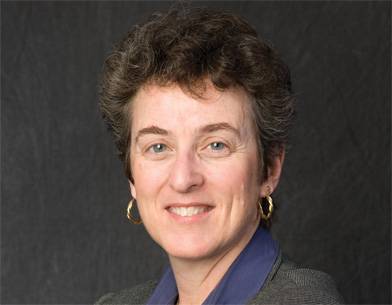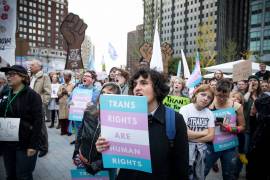
Of Counsel: The Freedom to Worship Is Not the Freedom to Shun
Blog Search
With nine states and the District of Columbia now respecting same-sex couples’ freedom to marry, and voters in four states having rejected antigay bias in state ballot questions concerning marriage last November, it is clear change is happening. Marriage equality bills have been introduced in Illinois, Rhode Island, Minnesota and Hawaii, a bill is expected soon in Delaware, and more than 100,000 same-sex couples identify themselves as married.
In the face of this momentum and the fast-growing acknowledgment that society lacks good reasons to deny lesbian and gay couples an opportunity that is joyful for so many, some who oppose this change on religious grounds are seeking to interpose a buffer. They claim that requiring them to sell to, serve or otherwise interact with same-sex couples who intend to marry violates their religious beliefs and practices, and that, therefore, they deserve an exemption from rules that generally regulate everyone’s conduct in the marketplace. Troublingly, respect for our constitutional value of protecting religious belief and worship often prompts at least initial receptivity to these proposals as the price to be exacted from same-sex couples for their freedom to marry. Such arguments are both legally and civically problematic.
A legal framework already exists that ensures liberty of belief and worship while also ensuring that citizens may not harm each other, regardless of whether motivated by religious doctrine or personal views. As the U.S. Supreme Court put it more than 70 years ago in Cantwell v. Connecticut, religious liberty “embraces two concepts—freedom to believe and freedom to act. The first is absolute but, in the nature of things, the second cannot be. Conduct remains subject to regulation for the protection of society.”
Robust protections for the free exercise of religion already exist in state constitutions and in the First Amendment of the U.S. Constitution. These guarantees prevent government from requiring any individual or group to perform or participate in a religious ceremony, including a religious marriage. Consequently, individual denominations retain absolute freedom to determine who among the couples eligible to marry under state law are eligible to marry within their faith tradition.
However, religious groups and individuals also choose whether and how much to participate in the public sphere, and existing law and precedent restrict the ability of business establishments operating in the public marketplace to pick and choose in a discriminatory manner among potential customers when offering goods or services to the public. When one enters a bakery, a restaurant, a hotel, a clothing store, a print shop, or any other commercial establishment, our public accommodations laws ensure that he or she is entitled to be served as others are served, regardless of the religious views the proprietor or employees may hold about those who are different or hold different views.
The implication in the civil rights area is obvious, as the U.S. Supreme Court made plain 50 years ago in Heart of Atlanta Motel, Inc. v. United States, 379 U.S. 241, 259 (1964), when it held that discriminatory “referrals” of patrons based on personal characteristics such as race injure not only those deemed by others to be “objectionable,” but society as a whole. It was the “overwhelming evidence of the disruptive effect” such discrimination has on commerce that justified Congress’ action under the Commerce Clause. Indeed, the Supreme Court’s ruling was unanimous that government does not improperly burden religious freedom when making and enforcing laws—such as antidiscrimination laws—that police the public sphere to insist upon fair, peaceful interactions.
And were this not the case, imagine how changed—how segregated and contentious—our society would become if, for example, landlords could evict tenants when they disapprove for religious reasons of the race, national origin, religion or sex of a tenant’s spouse or domestic partner. What if loan agents could refuse a mortgage based on religious disapproval of the co-applicant spouse? What if a hotel or motel manager could, on religious grounds, refuse would-be guests? Now imagine the isolation and anguish of a hospital patient or nursing home resident denied visitation with his or her lawful spouse because staff members, or a religiously affiliated institution’s policies, refuse on religious grounds to honor the patient’s marriage.
These are likely consequences of religious exemptions that recently have been requested of legislatures considering marriage equality bills. If permitted by changes to a state’s nondiscrimination laws, all are sadly plausible given the seeming proliferation of religiously motivated harassment and refusal of services based on sexual orientation, especially services pertaining to weddings. Problems have arisen concerning employment and medical care, as well as refusal of lodging and reception facilities, photography services, and wedding dresses and cakes, as just a few examples. Nor are these problems new. Our nation’s history of religiously motivated discrimination based on marital status, sex, race, and other grounds reveals the long and inglorious pedigree of today’s use of religion in defense of antigay discrimination. The good news is that enforcement of nondiscrimination laws has dramatically reduced citation of religion to excuse these other forms of discrimination, making possible increased harmony between religious freedom and equal access guarantees.
The same can and must happen for antigay discrimination. When anyone engages in business or practices a profession regulated by the state to protect others, they should be subject to the religious free exercise principle that has served our country well for decades: “‘When followers of a particular sect enter into commercial activity as a matter of choice, the limits they accept on their own conduct as a matter of conscience and faith are not to be superimposed on the statutory schemes which are binding on others in that activity.’” (Catholic Charities of Sacramento, Inc. v. Superior Court, 32 Cal. 4th 527, 565 (2004), quoting United States v. Lee, 455 U.S. 252, 261 (1982)). Indeed, there is poignancy as well as principle behind the point when those who choose to make their living selling wedding services or goods demand special exemption from anti-bias laws in order to inject sectarian hostility into a business field ostensibly about celebrating love and commitment.
Of Counsel is Lambda Legal’s bimonthly newsletter offering special insight for the legal community, including analysis of Lambda Legal litigation and reflections on strategies and tactics. Subscribe today!




